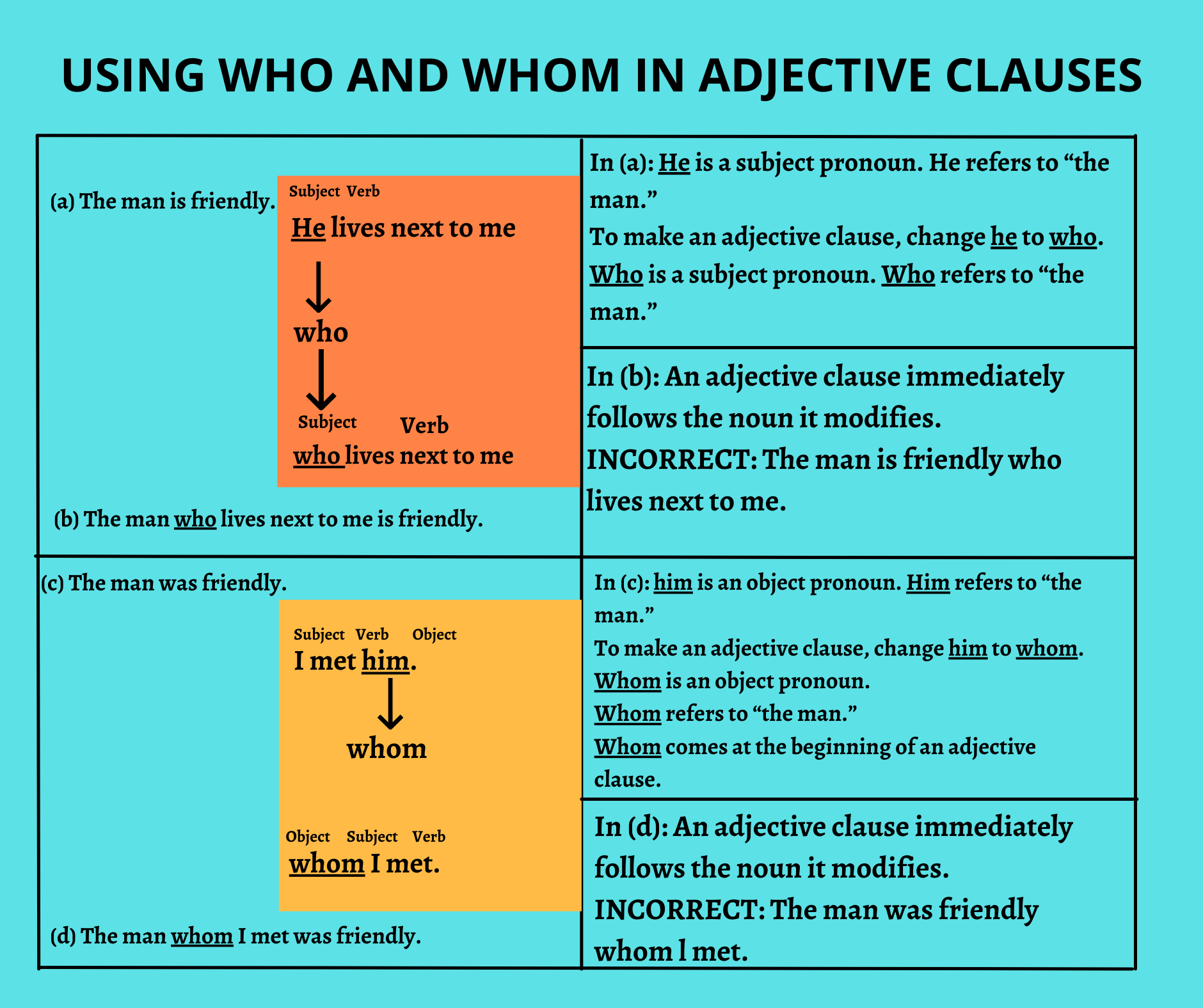Who and Whom in English language
Who or Whom?
Language lovers and writers have been debating and confusing the way of when to use “who” and “whom” in sentences. A new modern way to solve this issue is to use only “who” in many cases. This post will be explaining and showcase the difference between.
1. Who is used as the subject of a sentence or a clause (long sentence containing a subject and verb) and not as an object.
Who said we wouldn’t pass the final exam? (Who is the subject of the sentence.)
Can you tell who is going to visit us today? (Who is the subject of the clause.)
The job goes to whoever passes the interview. (Whoever is the subject of the clause.)
2.
Whom is always used in the objective case as the object of a verb or preposition. It is not used as the subject.
Address the letter “To Whom It May Concern.” (Whom is the object of the preposition to.)
Whom did you see at the party? (Whom is the object of the verb see.)
Are there any movies whom you would recommend? (You is the subject of the verb recommend; whom is the object of that verb.)
The reward goes to whomever you believe is the winner. (Whomever is the object of the verb call. You is the subject. Compare this sentence with the one using whoever.)
The use of “Who” and “Whom” in adjective Clauses

The use of “Who” and “Whom” in adjective Clauses
(a) The man is friendly.
In (a): He is a subject pronoun. He refers to “the man.”
To make an adjective clause, change he to who. Who is a subject pronoun. Who refers to “the man.”
(b) The man who lives next to me is friendly.
In (b): An adjective clause immediately follows the noun it modifies.
INCORRECT: The man is friendly who lives next to me.
(c) The man was friendly.
In (c): him is an object pronoun. Him refers to “the man.”
To make an adjective clause, change him to whom. Whom is an object pronoun.
Whom refers to “the man.”
Whom comes at the beginning of an adjective clause.
(d) The man whom I met was friendly.
In (d): An adjective clause immediately follows the noun it modifies.
INCORRECT: The man was friendly whom l met.
“Thank you for taking the time to explore this topic with us! We hope you found the information helpful and insightful. Have any thoughts, questions, or additional examples to share? We’d love to hear from you in the comments below!
Don’t forget to spread the word by sharing this blog with your friends, family, and colleagues. Together, let’s continue to learn, grow, and connect with the world around us. Happy reading and sharing!”
Follow Me On TikTok:
Follow me!????????????????
Follow me on YouTube:
-

Watch the video, then answer the question. #learnenglish #quiz #english #shorts
-

Watch the video, then answer the question. #quiz #learnenglish #english #englishquizchannel #shorts
-

Watch and learn #learnenglish #English #shorts
-

Quiz time. Watch then answer the question. #quizchallenge #quiz #riddles #puzzle #shorts
-

Watch the video, then answer the question. #LearnEnglish #QuizTime #english #shorts
-

Quiz time. Watch then answer the question. #quiz #quizchallenge #learnenglish #shorts
-

Watch the video and answer the question. #quiz #learnenglish #english #quizchallenge #shorts
-

Quiz challenge. Watch then answer. #quiz #quizchallenge #learnenglish #shorts
-

Quiz time. Watch then answer the question. #quiz #quizchallenge #shorts
-

Watch the video, then answer the question. #learnenglish #quiz #english
-

Watch the video, then answer the question. #learnenglish #quiz #english #shorts
-

Quiz challenge. Watch then answer. #quiz #quizchallenge #learnenglish #shorts
Subscribe!????????????????
What topics/worksheets do you need? Let me know in the comments below!




















